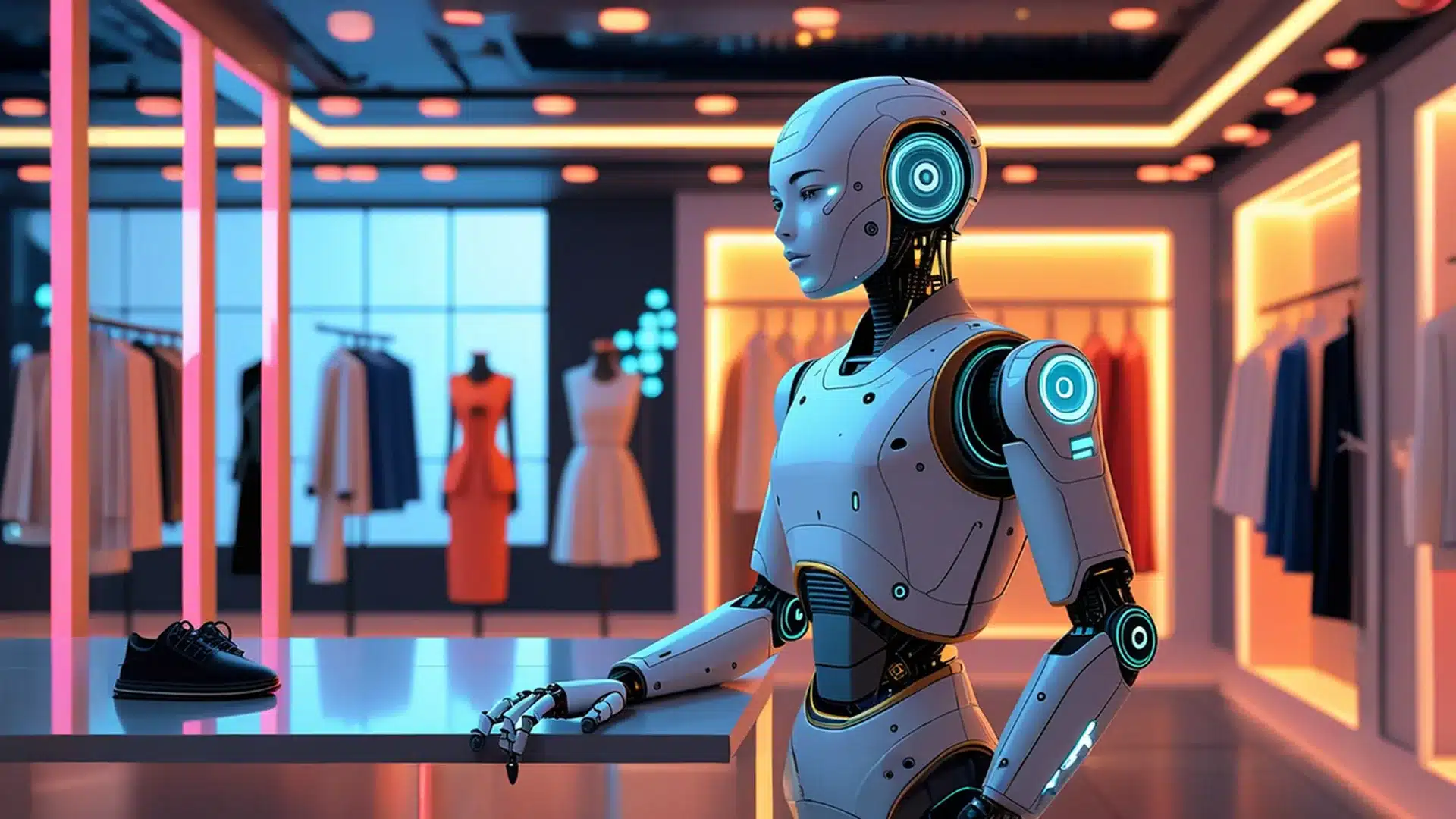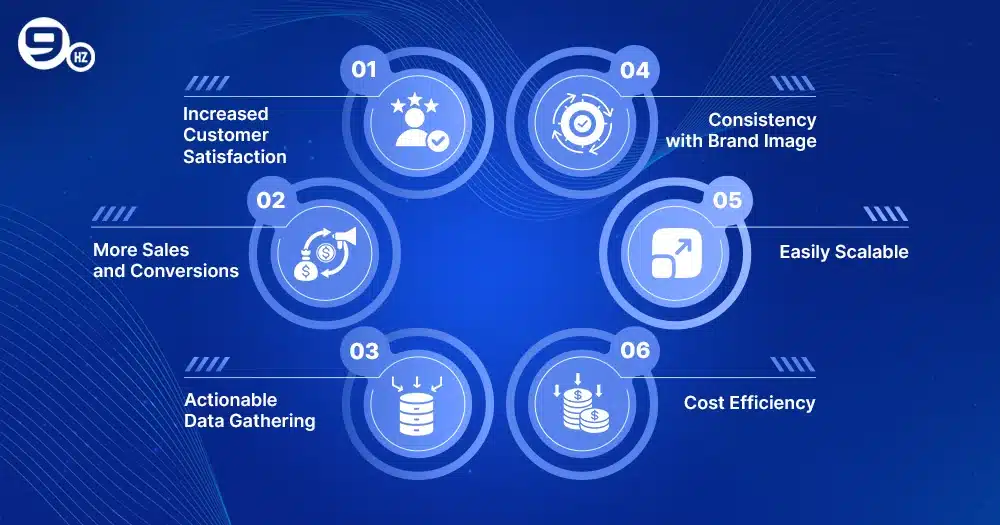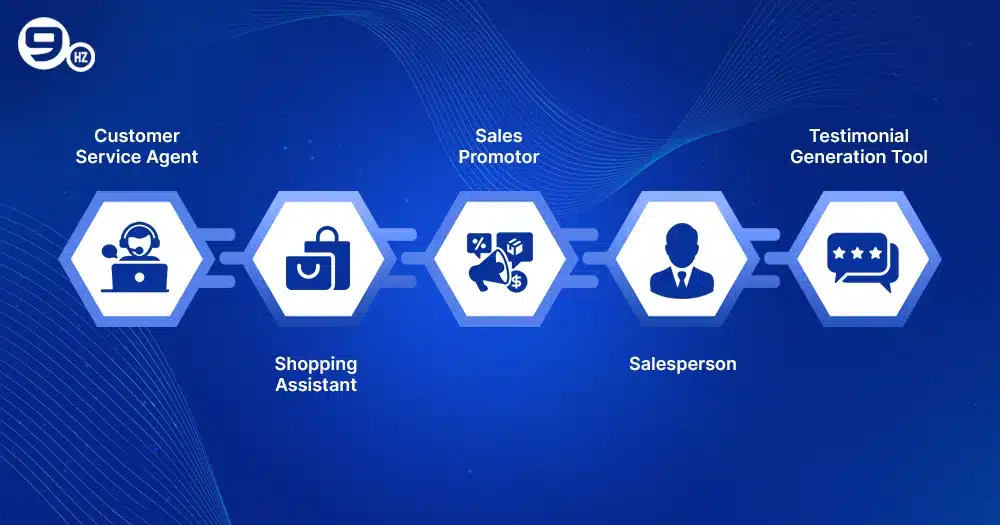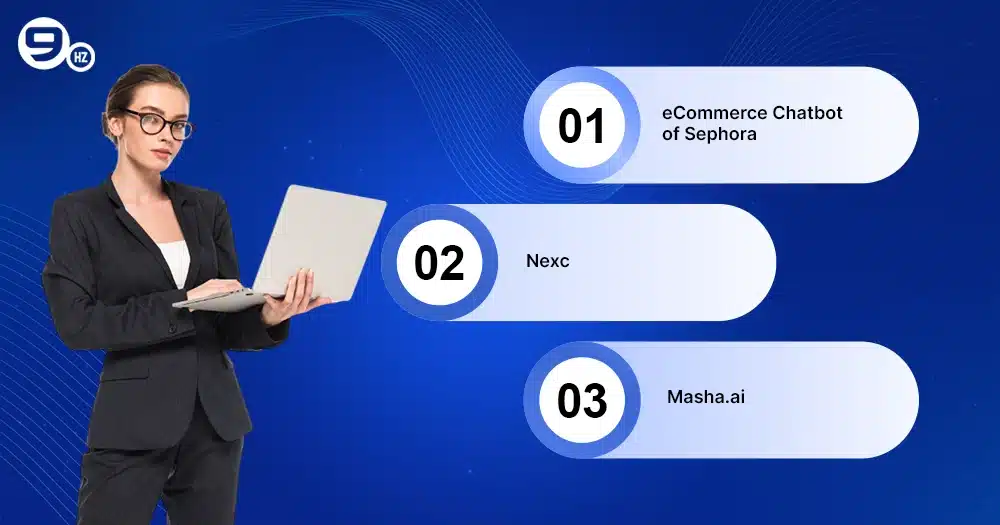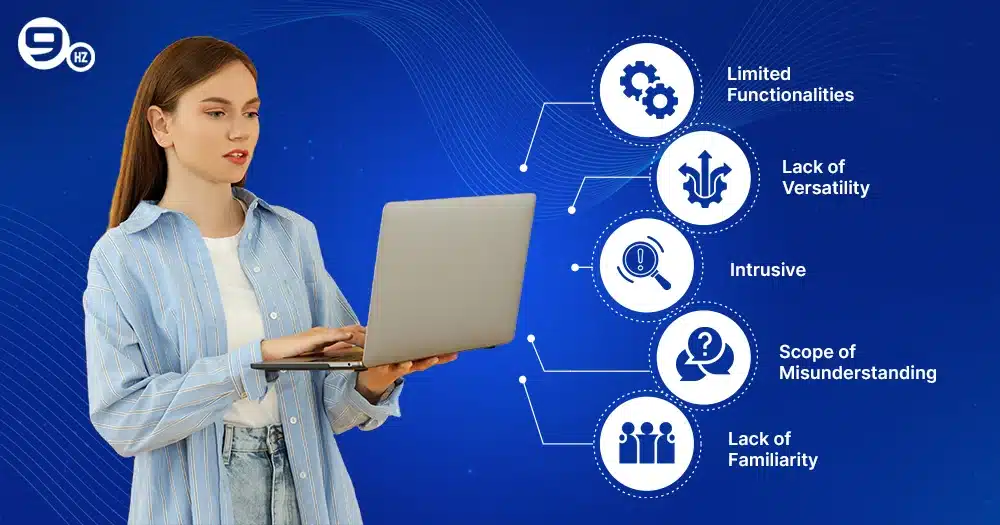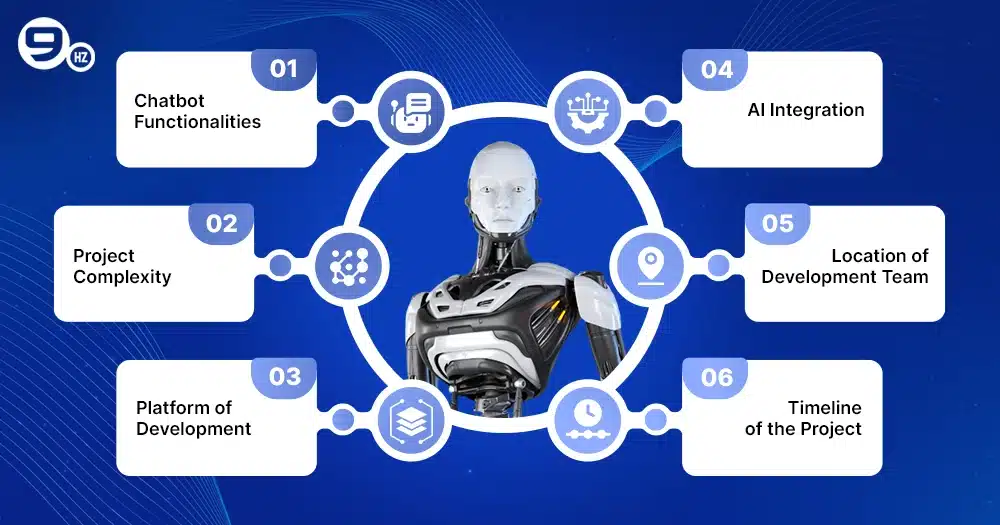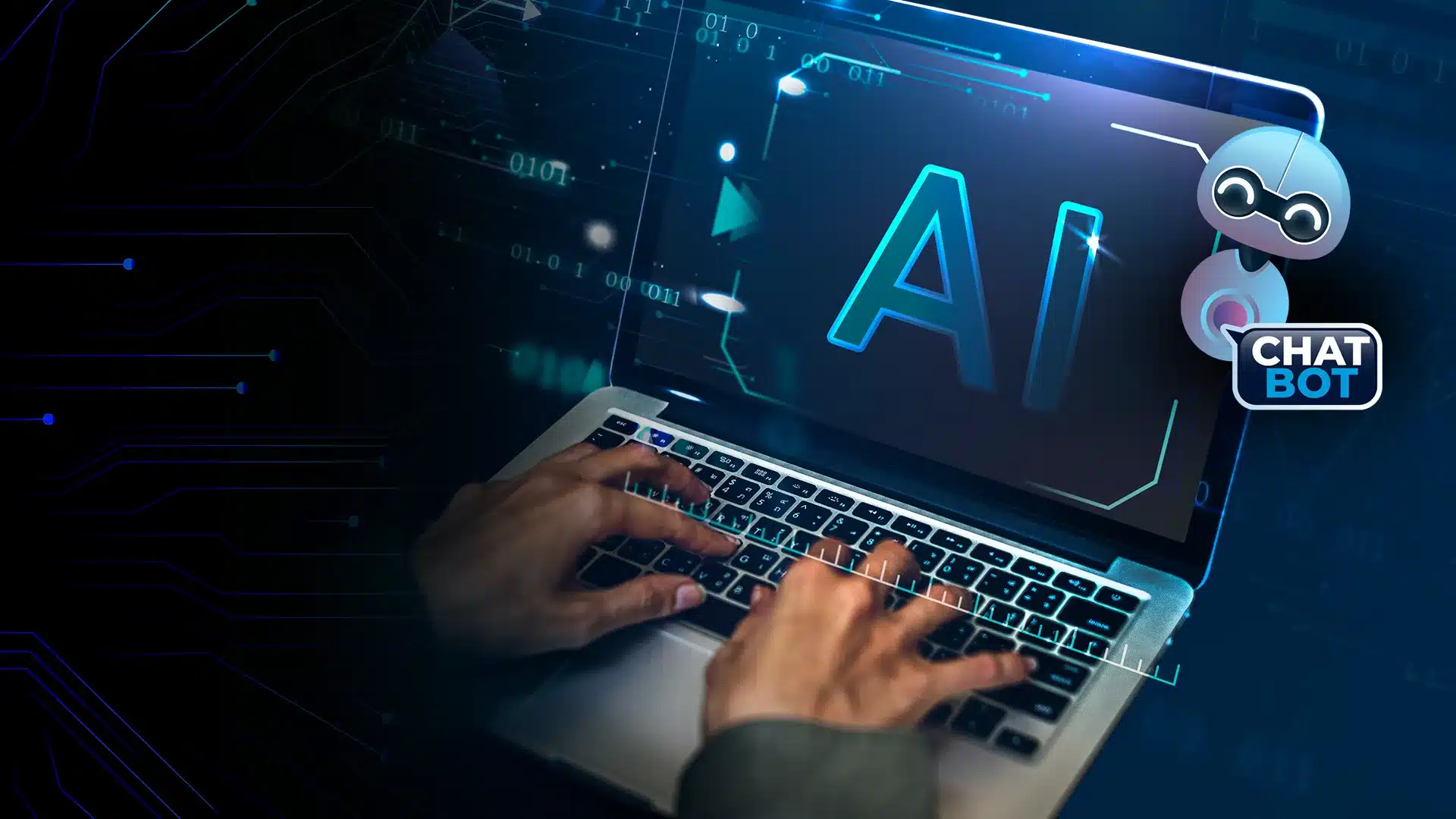The increased preferences of customers towards online shopping have made it very challenging for eCommerce store owners to provide ample support to their customers. According to Statista, global eCommerce sales were $6 trillion in 2024 which is further expected to cross $8 Trillion by 2028. In such a scenario, an eCommerce AI chatbot has proven to be the best tool to help store owners provide personalized customer experiences.
The global chatbot market was valued at $7.76 billion in 2024 and is expected to grow at a CAGR of 23.3%. Implementing a smart chatbot for eCommerce not only helps customers get instant resolutions to their queries but also helps business owners save a lot of financial and human resources.
If you are looking to build an AI-integrated eCommerce chatbot, partnering with a trusted AI chatbot development company can help you streamline the process. In this blog, we will guide you through everything from features to timeline and the overall cost of developing an AI-powered chatbot for your eCommerce business.
What Are eCommerce Chatbots?
eCommerce chatbots are the automated chat interface that is integrated with the online store. The chatbots are trained on the particular dataset which enables them to welcome the customer to the store, collect their feedback, answer queries, and connect them to the right department if needed. The eCommerce chatbots act as sales assistants, shopping guides, and customer service representatives. Irrespective of the number of customers and time of the day, the AI eCommerce chatbot provides consistent support.
With the help of these ECommerce AI chatbots, it has become easier for online business owners to connect to their customers 24*7, identify the areas of improvement, and provide instant support without putting heavy investments in customer support agents. The personalized experience for the customers helps them to increase overall revenue and retention.
Benefits of eCommerce Chatbots
Chatbots in eCommerce have been proven very beneficial for both customers and store owners. Along with minimizing customer support agent costs, AI chatbots help automate query resolution and feedback gathering, ensuring quick and accurate responses. These AI chatbot benefits allow businesses to enhance customer engagement, provide 24/7 support, and deliver a highly personalized shopping experience. Additionally, automation frees up valuable time for store owners to focus on more strategic and revenue-generating tasks. Here are the major benefits associated with eCommerce chatbot development.
1. Increased Customer Satisfaction
AI eCommerce chatbots help in boosting customer satisfaction by providing on-demand answers and personalized care. Artificial intelligence and natural language processing help to understand the customer’s emotions and address the challenges accordingly.
2. More Sales and Conversions
The recommendation engine helps the customers find relevant and important products that also increase the per-customer purchase size. So, there are more chances of customers checking out the filled cart.
3. Actionable Data Gathering
Chatbots in eCommerce consistently interact with the customer and thus gather data about their preferences and interests. This data helps significantly the store owners to make data-driven decisions and shape the marketing strategies accordingly.
4. Consistency with Brand Image
The AI eCommerce chatbot interacts with the customers according to the provided dataset. So, the responses and interaction emotions of the chatbot are aligned with the particular brand image.
5. Easily Scalable
According to the changing business size and client requirements, eCommerce chatbot development services are highly flexible and scalable. The new data and capabilities can be added that will make the chatbot efficient in engaging with more customers.
6. Cost Efficiency
This is one of the biggest benefits that AI eCommerce chatbots bring along. The technological solution eliminates the need for human resources to work in different shifts and provide consistent support. So, the cost of hiring a customer support agent is directly saved.
Use cases of eCommerce Chatbots
More than just a mediator between the customers and the store, there are a lot of other use cases associated with the integration of AI eCommerce chatbot development. These tools are versatile enough to streamline different tasks while ensuring efficiency and accuracy.
1. Customer Service Agent
This is one of the most basic use cases of an eCommerce chatbot where it acts as the personalized customer service agent for the eCommerce store. The chatbot helps to solve queries, offers 24*7 support, and provide consistent responses.
2. Shopping Assistant
Another core use case of the AI chatbot is that of a shopping assistant that helps customers find relevant products and versions from hundreds of listed products. At the same time, it also understands the customer’s requirements to suggest the right product.
3. Sales Promoter
The smart eCommerce chatbot can also act efficiently as a sales promoter. The store operators can use the chatbots to share exclusive deals and offers to their customers as soon as any customer logs into the store.
4. Salesperson
You can make your AI eCommerce chatbot your personal sales professional. If your store has customers who need specific products regularly, your chatbot can take care of the frequency and approach the customers before they think of any other vendor.
5. Testimonial Generation Tool
The eCommerce chatbot has proven to be a great feedback-gathering tool. Once the customers purchase something from the store, the chatbot will automatically connect to them and ask about their experience with the customer or the store.
Real-world Examples of eCommerce Chatbots
According to Tidio, more than 60% of the B2B and 42% of the B2C companies rely on the chatbot for connecting to their customers and ensuring a smoother user experience. There are plenty of real-world examples of eCommerce companies that have implemented the AI chatbot and steered increased revenue along with a smoother workflow.
1. eCommerce Chatbot of Sephora
Sephora is a premium luxury beauty brand that relies heavily on its integrated chatbot for seamless customer support. Whether it is advice for the product, searching through the photo, or watching a tutorial, the chatbot helps with everything.
According to the SVP of Marketing and Brand at Sephora, the AI chatbot has helped significantly to reconnect with the GenZ audience and encourage them to use the beauty of the products and learn from tutorials.
2. Masha.ai
This is an advanced AI chatbot system created by Facebook that works with more than 600 brands worldwide including Nike, ASOS, TopShop, Armour, and Swarovski. The chatbot has the capability of providing consultation for over 50 product categories.
Frederik Van Lierde, CEO and founder of Masha.ai has shared that the goal behind launching this chatbot is to shorten the shopping time for consumers by providing them the required assistance.
3. Nexc
This chatbot is currently in the development stage which is exclusively designed for the seamless shopping of electronic appliances and gadgets. With natural language processing, the chatbot will be able to understand the customer’s requirements and suggest the products that best satisfy the customers’ needs.
The chatbot can provide a list of electronic products with expected features that can align with the present-time needs of the customers.
Challenges of eCommerce Chatbots
While there are tons of benefits that businesses can leverage by using smart chatbots, there are certain challenges associated with the use of automated chatbots in eCommerce. Let’s have a glance over the possible challenges that you must understand before choosing a chatbot for your eCommerce store-
1. Limited Functionalities
Most businesses are using chatbots with limited functionalities which are unable to contribute much. At the same time, affording advanced chatbots like those of Google Assistant or Siri is not easy for the wide range of e-commerce store owners.
2. Lack of Versatility
There are several businesses that can leverage the benefits of eCommerce chatbots. However, it has been observed that chatbot assistance is more suitable for the business with straightforward products or services. If the businesses are providing complex and technical machinery that is prone to malfunctioning, the chatbots might not be able to serve that efficiently.
3. Intrusive
You must place the chatbot in your store in a way that it doesn’t interfere unnecessarily with the customers during their shopping. For example, the chatbots popping up as soon as the customer visits the store, and asking them to fill out the specific forms can impact the customers’ experience. Similarly, if the chatbot is covering any important information like price, availability, size, etc, it might lead to customer dissatisfaction.
4. Scope of Misunderstanding
As long as you are not investing in an AI-driven advanced chatbot for eCommerce, there will be scope for misunderstanding. If the customer is asking something that is not covered in the trained dataset, the chatbot might not be able to answer it. At the same time, not all chatbots have the capability of understanding customer emotions, tones, and expectations.
5. Lack of Familiarity
For people who are not that technically advanced, it is challenging for them to learn how to talk to a chatbot to get the expected outcomes. This lack of familiarity affects the navigation installed in the chatbot and thus the customer might never be able to find the right solution even if it is available with the bot.
What is the eCommerce Chatbot Development Cost?
The cost to build an eCommerce chatbot is highly variable as it depends on a range of factors. For example, you can build a chatbot for a few thousand dollars but if you are looking for an advanced solution, the cost might climb to a few hundred thousand dollars. So, instead of relying on blurry numbers as the development cost, it is better to have an idea about the factors that will help to determine the actual cost.
1. Chatbot Functionalities
There’s a huge cost difference between basic, advanced, and customized chatbot development. For example, if you need an eCommerce chatbot for simple tasks like appointment management and answering FAQs, it will be highly cost-efficient as compared to the chatbot carrying advanced functionalities like dynamic conversation flow and system integration.
2. Project Complexity
The complexity of the project is directly proportional to the cost of eCommerce chatbot development. The complex projects require more time, higher expertise, and advanced technologies which ultimately leads to the final pricing of the software. The complexity of the project increases with the features like multilingual capabilities, sentiment analysis, continuous improvement, etc.
3. Platform of Development
The platform for your eCommerce chatbot plays an important role in determining the development cost. For example, web-based chatbots are generally cost-efficient as compared to mobile app chatbots. At the same time, the multichannel chatbots which can perform on different platforms are higher in cost.
4. AI Integration
If you want to leverage industry 4.0 technologies like artificial intelligence, machine learning, virtual reality, and blockchain, the development cost will increase simultaneously. You can invest more to integrate NLP, machine learning, and pre-trained AI models into your solution.
5. Location of Development Team
The country of the development team you are working with has a significant impact on the overall project budget. The cost of developers in countries like the USA, the UK, Europe, and Australia, is more than double as compared to the cost of developers from countries like India.
6. Timeline of the Project
If you are choosing the hourly hiring model to partner with the eCommerce chatbot development company, the total cost will depend entirely on the timeline of the project. The longer it takes for the developer to complete the project, the higher the cost.
Here is a rough estimation of eCommerce development cost according to its functionalities and capabilities-
| Chatbot Type | Estimated Cost ($) | Development Time (Weeks) | Description |
|---|---|---|---|
| Rule-Based Chatbot | $10,000 – $15,000 | 2 – 4 weeks | Basic Chatbots that work on pre-defined rules. |
| Generative AI Chatbot | $80,000 – $250,000+ | 12 – 16+ weeks | The chatbot integrated with natural language processing and a large language model to better understand customer behavior. |
| Multilingual Chatbot | $20,000 – $60,000 | 6 – 10 weeks | The chatbot in the eCommerce store can identify the language and respond accordingly. |
| AI-Powered Chatbot | $35,000 – $80,000 | 5 – 9 weeks | AI-integrated chatbot to assess and gather data about customer buying preferences and their feedback. |
How can The Ninehertz help you with eCommerce Chatbot Development?
The NineHertz is a leading eCommerce chatbot development company with 15+ years of experience in software and digital product development. We have enabled eCommerce brands globally to build their customized chatbot, provide a better customer experience, and establish a stronger connection with the client.
We have a large technology stack that enables us to build the solutions from scratch, imparting each functionality as per your requirements.
The NineHertz follows a cost-efficient approach where the client only pays for what they need. We have the defined quality standards along with a robust team of quality analysts which ensure the utmost quality of software before deployment.
Our post-maintenance and support service helps to bring new features into the chatbot, making it capable of adapting the market trends.
The NineHertz maintains complete transparency of the process where the clients are kept in the loop for all the updates and milestones achieved.
We place the non-disclosure agreement at the center of the process which maintains the confidentiality of project and client data.
Conclusion
An automated eCommerce chatbot ensures that customers don’t abandon the cart in the middle of the purchasing journey. Also, it provides all the assistance that the customer needs before or after making the purchase. Competencies like these help the eCommerce business to scale globally by maintaining a higher customer retention rate. If you are also looking to build a customized customer support chatbot for your eCommerce store, connect with The NineHertz and find out what you need. Sign up for our free consultation session now.
Frequently Asked Questions (FAQs)
How do AI chatbots improve eCommerce services?
AI chatbots significantly enhance eCommerce services by providing personalized recommendations, instant customer support, order tracking, and much more. The chatbot helps to facilitate better customer engagement thus contributing towards a better customer experience.
Are AI chatbots secure for monetary transactions?
Yes, AI chatbots are secured for monetary transactions. However, you must ensure that the chatbot is integrated with features like encryption, compliance, and multi-factor authentication. Also, the chatbot must be compliant with the standards like PCI DSS.
Which eCommerce platforms are using AI chatbots?
There are many global eCommerce platforms that are using AI chatbots. It includes Shopify, Magento, WooCommerce, BigCommerce, Amazon, eBay, Alibaba, and Salesforce Commerce Cloud.
What technologies power AI chatbots in eCommerce?
Technologies like natural language processing, artificial intelligence, machine learning, speech recognition, cloud-based computing, and sentiment analysis power the AI chatbot in eCommerce. These technologies help the brands to understand better about customer behavior and serve accordingly.
Can a chatbot offer customer support 24/7?
Yes, chatbots are designed to provide customer support 24/7. The digital assistant helps to answer customer queries, take follow-ups, gather feedback, offer recommendations, and resolve common issues without needing human intervention.
How does a chatbot help reduce customer service costs?
With AI chatbots in eCommerce, the need for hiring human customer agents and saving on salaries. Also, it doesn’t require any infrastructural investment for the custom agent team which makes it further reduces customer service costs.
Can a chatbot handle product returns and exchanges?
Yes, a chatbot can efficiently handle the returns and exchanges. The chatbot is capable of assessing order details, recording the reason for the return, tracking the return order, and updating the customer about the refund status.
